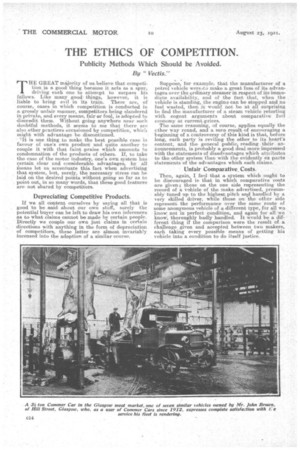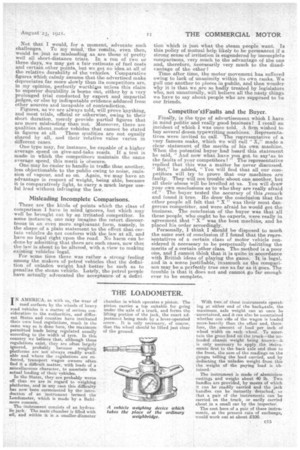THE ETHICS OF COMPETITION.
Page 10

Page 11

If you've noticed an error in this article please click here to report it so we can fix it.
Publicity Methods Which Should be Avoided. By " Vectis."
T' HE GREAT majority of us believe that. competition is a goody thing because it acts as a spur, driving each one to attempt to surpass his fellows. Like many good' things, however, it is liable to bring evil in its 'train. There are, of course, cases in which competition is conducted in a grossly unfair manner, competitors being slandered in private, and every means, fairer foul, is adapted to discredit them. Without going anywhere near such doubtful methods, it seems to me that there are also other practices occasioned by competition, which might with advantage be discontinued..
' It is one thing to make the best possible case in favour of One's own product and quite another to couple it with that faint praise which amounts to condemnation of the products of others. If, to take the -ease of the motor industry, one's own system has certain clear and considerable advantages, by all means let us accentuate this fact when advertising that system, but, surely, the necessary stress can be laid on the desired points without going so far as to point out, in so many words, that these good features aro not shared by competitors.
Depreciating Competitive Products.
If we all Content ourselves by saying all that is good. to be ;said about our own stuff, surely the potential buyer can be left to draw his own inferences as to what claims cannot be made by certain people. Directly we couple our own just claims in certain directions with anything in, the form of depreciation of competitors, these latter are almost invariably incensed into the adoption of a similar course. Suppose, for example, that the manufacturer of a petrol vehicle wererto make a great fuss of its advantages over the -ordinary steamer in respect of its immediate availability, and of the fact that, when the vehicle is standing, the engine can be stopped and no fuel wasted, then„it would not be at all surprising to find the manufacturer of a steam vehicle retorting with .cogent .arguments about comparative fuel economy at current prices. The same reasoning, of course, applies equally the ether way round, and a sure result 01 encouraging a beginning of a controversy of this kind is that., before long, 'each party is reviling the other to its heart's content, and thegeneral public, reading their announcements, is probably a good deal more impressed with the statements of disadvantages which attributes to the other system than with the evidently ex paste stateinents of the advantages which each claims. .
Unfair Cornpaxative, Costs.
Then, again, I feel that a system which ought to be discouraged is that. in which comparative costs are given; those on the one side representing the record of a 'vehicle of the make. advertised, presumably tuned up to the highest pitch and handled by a very skilled driver, while those on "the other side represent the performance over the same route of some anonymous vehicle of a different type, for all we know not in perfect conditien, and again for all we know, thoroughly badly handled.. It would be a different thing if the comparison were the result of a challenge given and accepted between two makers, each taking every possible means of getting his vehicle into a condition to do itself justice.
Not that I would, for a moment, ,advocate such challenges. To my mind, the reSults, even then, would be just as misleading as are those of pretty well all short-distance trials. In a run of two or three days, we may get a fair estimate of fuel costs and certain other points, but we get no idea at all of the relative durability of the vehicles. Comparative figures Which calmly assume that the advertised make depreciates far more slowly than its competitors are, in my opinion, perfectly worth14ss unless this claim to superior durability is borne out, either by a very prolonged trial conducted by expert and impartial judges, or else by indisputable evidence adduced from other sources and incapable of contradiction. Figures, as we are always told, will prove 'anything, and most trials, official or otherwise owing to their short duration, merely provide partial figures that are more misleading than not. Moreover, there are qualities about motor vehicles that cannot be stated in figures, at all. These qualities are not equally shared by all, and their 'relative value varies in different cases.
One type may, for instance, be capable of a higher average speed on give-and-take roads. If a test is made in which the competitors maintain the same average speed, this merit is obscure. One may be easier to handle in traffic than another, less objectionable to the public owing to noise, emission of vapour, and so on. Again, we may have an advantage in respect of weight, being able, because it is comparatively light, to carry a much larger useful load without infringing the law.
Misleading Incomplete Comparisons.
These are the kinds of points which the class of comparison I have in mind ignores, but which may • well be brought out by an irritated competitor. In some instances, one may imagine the retort discourteous in an even more unpleasant form, namely, in the shape of a plain statement to the effect that certain vehicles do not conform with the law at all, and have no legal right upon the road. No harm can be done by admitting that there are such eases, now that the law is about to be altered, with a view to making existing vehicles legal.
For some time there was rather a strong feeling among the makers of petrol vehicles that the definition of unladen weight had better be such as to penalize the steam vehicle. Lately, the petrol people have actually advocated the acceptance of a defini • tion which is just what the steam people want. Is this policy of mutual help likely to be permanent if a strong sense of irritation is engendered by 'incomplete comparisons, very much to the advantage of the one and, therefore, necessarily very much to the disadvantage of the other ? Time after time, the motor movement has suffered owing to lack of unanimity within its own ranks. We pull one another to pieces in public, and then wonder why it is that we are so badly treated by legislators who, not unnaturally, will believe all the nasty things we have to say about people who are supposed to be our friends.
Competitor'siTaults and the Buyer.
Finally, is the type of advertisement which I have in mind politic and really good business? •I recall an 'incident of which I was once told. A firm wished to buy several dozen typewriting machines: Representatives were invited to call. The representative of a very famous make, which we will call "X," made a clear statement. of the merits of his own machine. When the potential buyer had heard this statement he said, "And now what have you got to say'as to the faults of your competitors ? " The representative replied that this was a matter he never .discussed. "But," he added, "You will find that all our competitors will try to prove that our machines are faulty. They will not trouble about one another, but all their abuse will be levelled at us. You will draw your own conclusions as to who they are really afraid of."• The .buyer tested the accuracy of this *remark and foimd it true. He drew the conclusion that the other people all felt that " X " was their most dangerous competitor, and were afraid he would get the business. The conclusion of the buyer was that all these people, who ought to be experts, were really in agreement that " X " was the best machine, and he placed his order accordingly.
Personally, I think I should be disposed to much. the same sort of conclusion if I found that the representatives of a certain class of motor vehicle considered it necessary to be perpetually 'belittling the merits of a certain other class. The method is a, poor one and I cannot think that it is quite in accordance with British ideas of playing the game. It is legal, and in a sense justifiable, inasmuch as the comparison may be a. perfectly true one as far as it goes. The trouble is that it does not and cannot go far enough ever to be complete.
































